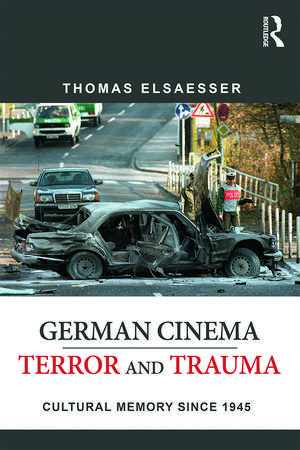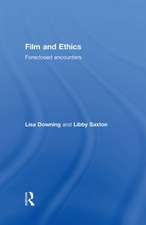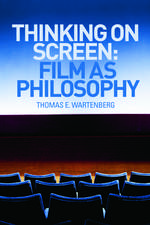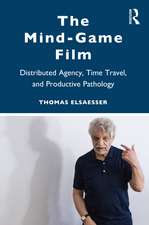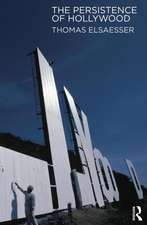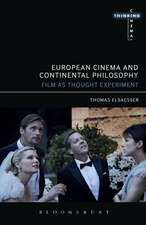German Cinema - Terror and Trauma: Cultural Memory Since 1945
Autor Thomas Elsaesseren Limba Engleză Paperback – 4 noi 2013
| Toate formatele și edițiile | Preț | Express |
|---|---|---|
| Paperback (1) | 361.96 lei 43-57 zile | |
| Taylor & Francis – 4 noi 2013 | 361.96 lei 43-57 zile | |
| Hardback (1) | 1389.05 lei 43-57 zile | |
| Taylor & Francis – 22 noi 2013 | 1389.05 lei 43-57 zile |
Preț: 361.96 lei
Nou
Puncte Express: 543
Preț estimativ în valută:
69.28€ • 75.28$ • 58.24£
69.28€ • 75.28$ • 58.24£
Carte tipărită la comandă
Livrare economică 21 aprilie-05 mai
Preluare comenzi: 021 569.72.76
Specificații
ISBN-13: 9780415709279
ISBN-10: 041570927X
Pagini: 352
Dimensiuni: 152 x 229 x 25 mm
Greutate: 0.59 kg
Ediția:1
Editura: Taylor & Francis
Colecția Routledge
Locul publicării:Oxford, United Kingdom
ISBN-10: 041570927X
Pagini: 352
Dimensiuni: 152 x 229 x 25 mm
Greutate: 0.59 kg
Ediția:1
Editura: Taylor & Francis
Colecția Routledge
Locul publicării:Oxford, United Kingdom
Public țintă
General, Postgraduate, Professional, and UndergraduateCuprins
Introduction: Terror and Trauma Part I: Terror, Trauma, Parapraxis 1. Terror & Trauma: Siamese Twins of the Political Discourse 2. Memory Frames and Witnessing: Burdens of Representation and Holocaust Films 3. The Poetics and Politics of Parapraxis 4. Generational Memory: The RAF Afterlife in the New Century Part II. Parapractic Poetics in German Films and Cinema 5. Rescued in Vain: Parapraxis and Deferred Action in Konrad Wolf’s Stars 6. The Persistent Resistance of Alexander Kluge 7. Retroactive Causality and the Present: Fassbinder’s The Third Generation 8. Mourning as Mimicry and Masquerade: Herbert Achternbusch’s The Last Hole 9. Re-wind after Re-play: Harun Farocki’s Respite Part III: Trauma Theory Reconsidered 10. From Mastering the Past to Managing Guilt: Holocaust Memory in the New Century 12. Postscript to Trauma Theory
Recenzii
"For the past thirty years or so, Thomas Elsaesser has been one of the most astute critics of European cinema and one of the foremost theorists of cinema in general. German Cinema – Terror and Trauma is a thorough analysis of how trauma, the Holocaust, memory, and guilt have continually affected German filmmakers and the lives of Germans up to the present. I am convinced that Elsaesser's work will be of utmost importance to anyone, student or general reader, who is interested in German post-war history and cinema." —Jack Zipes, Professor Emeritus, University of Minnesota
Descriere
In German Cinema – Terror and Trauma Since 1945, Thomas Elsaesser reevaluates the meaning of the Holocaust for postwar German films and culture, while offering a reconsideration of trauma theory today. Elsaesser argues that Germany's attempts at "mastering the past" can be seen as both a failure and an achievement, making it appropriate to speak of an ongoing 'guilt management' that includes not only Germany, but Europe as a whole. In a series of case studies, which consider the work of Konrad Wolf, Alexander Kluge, Rainer Werner Fassbinder, Herbert Achterbusch and Harun Farocki, as well as films made in the new century, Elsaesser tracks the different ways the Holocaust is present in German cinema from the 1950s onwards, even when it is absent, or referenced in oblique and hyperbolic ways.
